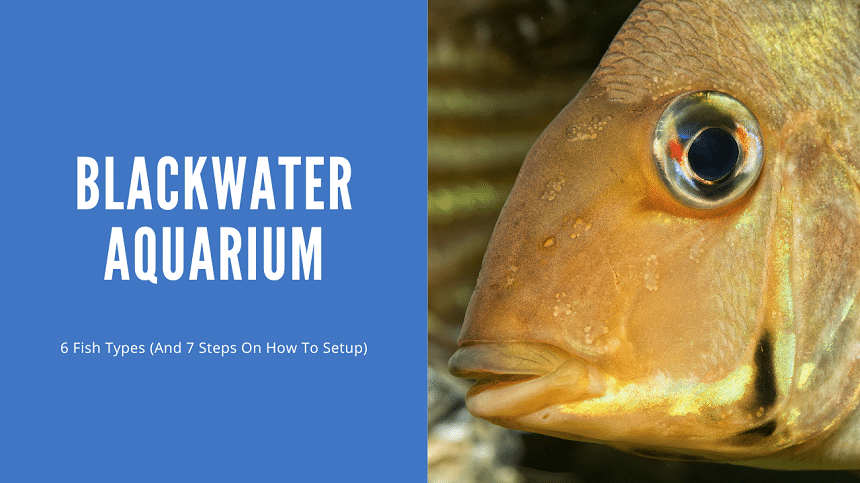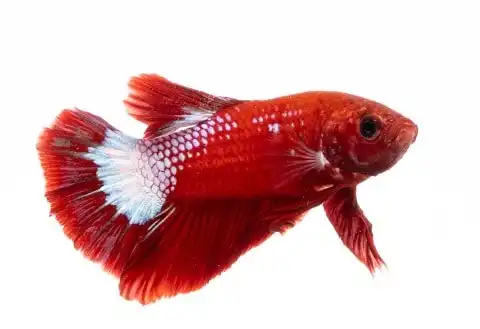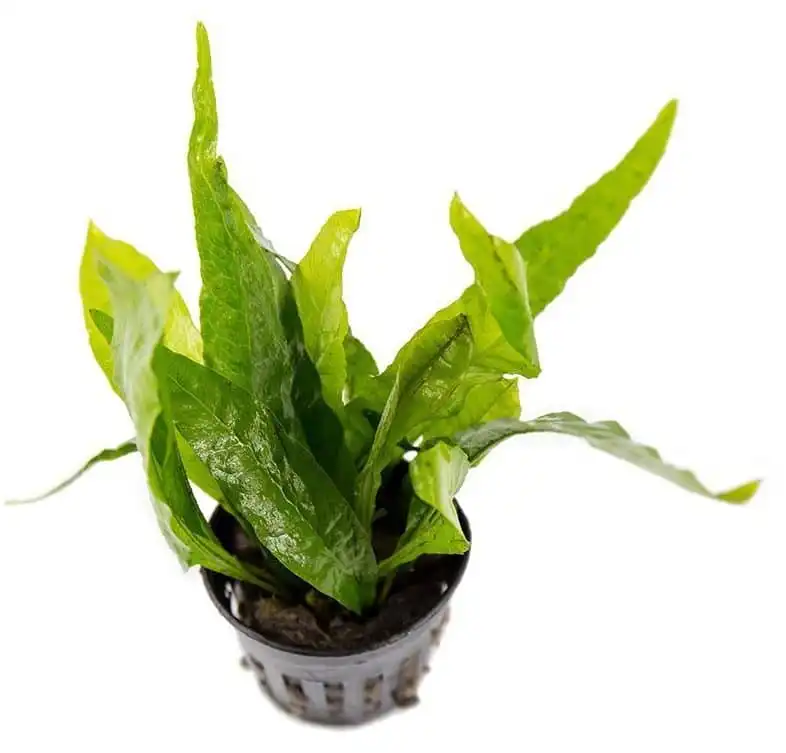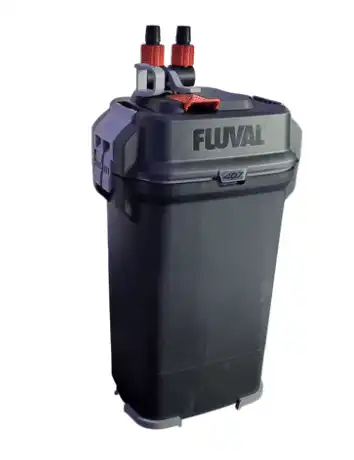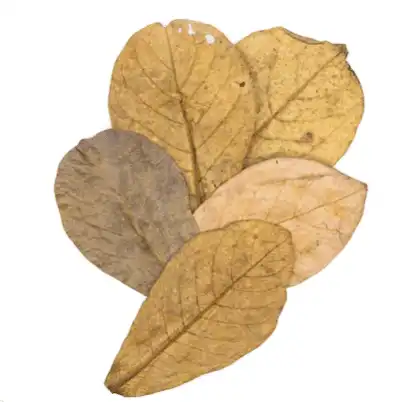Thank you for visiting! By the way… any links on this page that lead to products on Amazon and other stores/partners are affiliate links Aquarium Store Depot earns a commission if you make a purchase.
We’ve all seen planted aquariums with leaf litter that mimics the natural environment of swamps and floodplains. So aesthetically pleasing.
But did you know? There are certain fish species dedicated only to the blackwater biotopes. Such fish species are tropical fish that are conditioned to live with very low levels of dissolved minerals and high concentrations of organic compounds or matter.
Blackwater fish, as opposed to their name, are brightly colored with unique patterns and flawless beauty. These fish species love acidic water with pH 6.5 to lower. Some best examples of blackwater fish are Tetras, Rasboras, Hatchetfish, and Corydoras.
In this article, I’ll discuss several types of blackwater fish and give a brief overview of blackwater tanks.
Keep reading!
What Are Blackwater Aquariums (Blackwater Biotopes)?
Blackwater tank aquariums mimic the natural habitat of rivers, swamps, floodplains, and lakes. Since these blackwater rivers have low minerals and high organic compounds or matter, the color of the blackwater habitat is mostly dark water with a tannin-stained appearance.
And so, the fish species that inhabit these environments are called blackwater fish. Most blackwater fish prefer slightly acidic conditions having a pH of around 6.5 or below. Also, they need a balanced diet with live food or frozen foods.
Though mesmerizing, a blackwater tank is challenging to keep and maintain because of the unique water chemistry and conditions required by the blackwater fish.
Types of Blackwater Aquarium Fish
It is a popular belief that blackwater fish such as Tetras, Discus, Apistos, Loaches, and rams can thrive without soft water, low pH, or perfect water chemistry or water parameters. However, it’s not true.
Blackwater fish requires exceptionally crystal clean and clear water that is bacteria-free. Thus, make sure to keep blackwater fish, only if you can keep your tank clean.
Here is a list of some of the popular blackwater aquarium fish to keep in your home aquariums:
- Tetras
- Rasboras
- Hatchetfish
- Corydoras
- Discus
- Gourami
- Apistogramma and other dwarf cichlids.
1. Tetras
Many species of tetras thrive in a blackwater tank. The tetras that live in dark water such as in swamps, peat bogs, and blackwater rivers prefer low concentrations of dissolved minerals and ph-neutral substrates such as freshwater sand. Avoid using marine sand or gravel sand since they are usually made of limestone that breaks up and increases the pH levels of your tank.
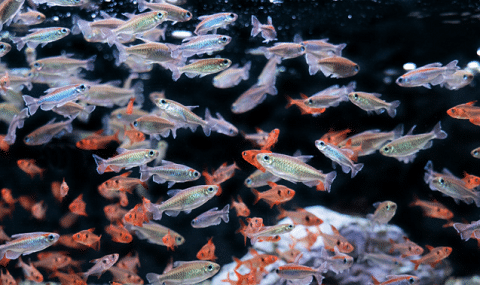
The tetras living in blackwater biotope have adapted to the blackwater conditions, thus, are very sensitive to changes in the water chemistry or parameters than other tetra species. Blackwater tetras are also more prone to stress and illness. So, proper monitoring should be done to avoid any mishaps.
2. Geophagus
Geophagus are a species of Cichlids found in the streams and blackwater rivers of South America. Blackwater tank hobbyists love Geophagus fish for the fact that it is a blackwater fish. Since they are a blackwater fish species, they require a specialized diet and water conditions to thrive in.
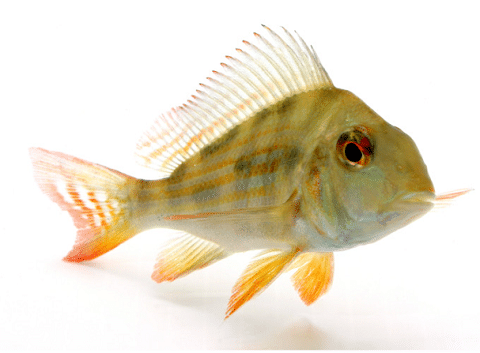
Also, they are territorial and aggressive towards other fish, so they need plenty of hiding places and large tank size to tame their aggressive traits. Nevertheless, Geophagus is a unique and enchanting addition to your freshwater fish tank.
3. Discus Fish
When we speak of blackwater aquarium fish, Discus is the first one that comes to mind.
Discus fish are usually called “the king of the aquarium fish”, and rightfully so. They have a serene, vibrantly colored body with a unique body shape that stands out from the crowd. Discus are well-adapted for blackwater tanks with low pH and high levels of organic matter.
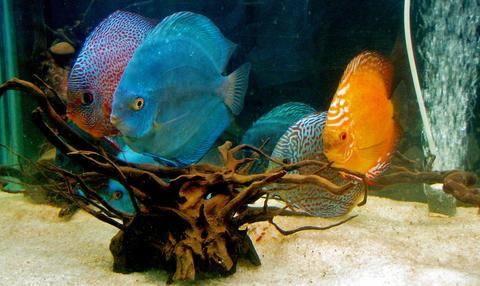
Discus loves hanging out in small groups, hence, ideal for a community tank. Also, it requires a varied diet to maintain the vibrancy of its colors and overall health. Therefore, the water conditions and nutritional requirements need to be met to keep a discus fish in a blackwater tank.
4. Gouramis
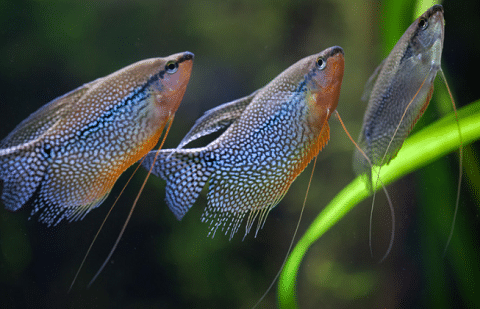
Gouramis, especially Chocolate Gouramis, enjoy the blackwater biotope setup as much as bettas and cichlids do. Just make sure your Gourami is happy with the soft, acidic, and tannin-filled water.
5. Dwarf Cichlids
Dwarf Cichlids are an excellent choice for a biotope aquarium. Check out our article on them for more info. There are several types available with German Rams being the most colorful
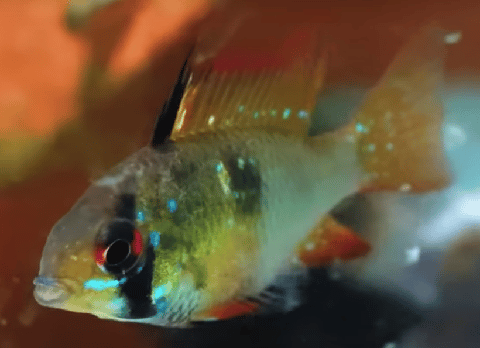
6. Betta Fish
If you’ve kept Betta fish or the Siamese fighting fish, you’ll understand that the use of tannins is not a novel concept. Experts aquarists use dried or dead Indian almond leaves to keep their bettas healthy, happy, and thriving. In the past, it has also been noted that bettas kept in tannin water with organic matter leached are more colorful and healthier.
Use Coupon Code ASDFISH at Checkout
Betta Fish are one of the most beautiful varieties of freshwater fish available in the hobby. Easy to care for with plenty of varieties!
How To Set Up
Setting up a blackwater biotope properly requires special attention and care due to the unique conditions of these environments. Here are some steps you can follow to set up a blackwater aquarium:
1. Choose A Suitable Tank Size
Choosing a suitable aquarium size for blackwater fish is not an issue. Since these fish species are usually small, the tank size is pretty flexible. Also, nano blackwater biotope are easy to maintain under strict water conditions.
Therefore, I recommend setting up a smaller tank starting with ultra-purified water and treating it with plant tannins.
If you want to keep fish species such as Discus fish and angelfish, you can opt for a 55 gallons tank or over only if you can maintain it.
2. Choose The Right Substrate
I recommend using a fine gravel substrate to provide your plants with a root zone. You can opt for a dark substrate, especially for planted aquariums. In all cases, marine sand or gravel should never be used because they are made of limestone and aragonite, which increase the pH levels of water.
To keep the pH neutral, it’s important to use freshwater sand or gravel. Basically, any substrate that is rich in organics or pH neutral would be the best choice for a blackwater biotope.
3. Add Live Aquatic Plants
If you’re into keeping live plants, choose plants that are adapted to low light and low pH conditions, such as Anubias or Java fern.
Live aquatic plants, although not necessary, provide beautiful aesthetics and a more natural environment for the blackwater fish. Also, plants are an ideal source of natural tannins, especially with the dead or decaying leaves.
- Choose plants that can survive low light and low pH conditions. Some good choices include Anubias, Java fern, and Cryptocoryne. Also, you can add floating plants such as Amazon frog bit, Najas Indica, red root floaters floating plants, etc.
- Use natural materials for decorations: Natural materials, such as driftwood, Indian almond leaves, aquarium wood, and rocks, can help to create blackwater habitats.
Java Fern is one of the easiest and hardiest live plants you can purchase
4. Set Up The Filtration System
To maintain excellent overall water chemistry, it’s important to install and set up an effective filtration system. Choosing a reliable filtration system for a blackwater aquarium is a daunting task because of the critical requirements.
I recommend setting up a canister filter or power filter. Also, remove activated carbon from the media chambers and use peat in place of activated carbon in the filter’s media. After adding the peat, closely monitor watercolor and water quality and adjust the peat quantity accordingly.
Our Subscriber's Choice
Top name brand, Italian made, and updated design. The next gen Fluval Canisters are a best buy!
5. Prepare The Fish
The blackwater habitat is relatively different from any freshwater or saltwater tanks. Therefore, it is important to prepare the fish before adding so it can adapt well.
6. Maintain The Water Quality
Blackwater aquarium tank works the best with general water hardness (GH) and carbonate hardness (CH) in the 2 to 5-degree range. This range has low dissolved minerals which are ideal for a blackwater aquarium.
Ideally, you should do partial water changes to keep the water in pristine condition for your blackwater fish.
Maintaining your tank water is the best bet for keeping a blackwater biotope aquarium. If the tank becomes too dark, up the number of water changes or does them a bit more regularly. If you need to clean the substrate or gravel, I recommend doing a quick “sweep” with a gravel siphon.
7. Choose The Right Tank Mates
It’s crucial to take the fish’s size, temperament, and care needs into account when selecting tank mates for blackwater fish.
To fit their tank size, many aquarium owners choose for smaller schooling fish that flourish in a planted aquarium. The following advice will help you select the best tank mates for your blackwater fish:
Think About The Fish’s Size
It is crucial to select tank mates that are comparable in size and temperament to blackwater fish because they are often tiny and quiet. Avoid larger or more aggressive fish since they could intimidate or damage the blackwater fish.
Choose Compatible Species
Blackwater fish originate from a range of habitats, so it’s crucial to pair them with tank mates who are acclimated to the same types of water. Included in this are elements like pH, temperature, and water hardness.
Think About The Care Demands
Some blackwater fish species could need particular care, including a particular food or amount of water flow. To guarantee that every fish can survive in the aquarium, it is crucial to pair species that require a similar level of care.
Pay Attention To The Amount Of Fish
Overcrowding the blackwater tank should be avoided as it might result in poor water quality and stress for the fish. Make careful to look up the appropriate tank size and stocking rates for each fish species you are thinking about.
FAQs
Is This Good For Tanks?
Yes, blackwater aquariums are suitable for fish designed for blackwater biotope. However, freshwater or saltwater fish might not be the right choice for a blackwater aquarium. Blackwater aquarium has low levels of dissolved minerals and high concentration of organic matter, which is not suitable for all fish types.
Why Is the Water Dark?
Blackwater is dark water because of humic substances or humic and fulvic acids.
Do Neon Tetras Like This?
Yes, Neon tetras (Paracheirodon innesi) are well adapted for Amazonian Blackwater environment and can thrive in these environments when given proper care.
Can Tetras Live In Blackwater?
Yes, some species of tetras are adapted to living in blackwater environments.
Can You Have Plants In This Type Of Tank?
Yes, you can have plants in a blackwater tank. Some examples of plants that may be suitable for a blackwater tank include Amazon sword plants, Anubias species, and Cryptocoryne species.
What Does This Look Like In A Tank?
Blackwater in an aquarium is water that appears black and tannin-stained, usually as a result of the presence of organic materials and little dissolved mineral content.
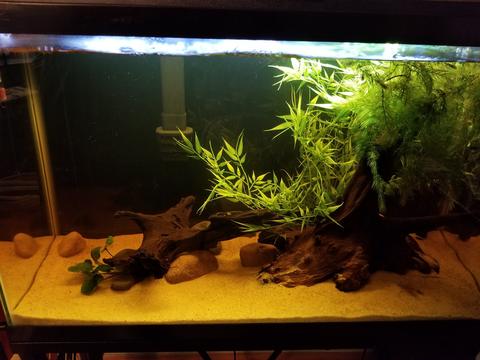
Blackwater habitats are prevalent in nature and are characterized by very low levels of dissolved minerals and a high concentration of organic matter. They may be found in shallow, slow-moving waterways like rivers, swamps, and floodplains. In the realm of fishkeeping, blackwater tanks can be formed by utilizing a dark-colored substrate consisting of organic materials, such peat moss or coconut coir, or by employing leaves (Indian almond leaves or oak).
These leaves can be added to your aquarium to help promote a natural habitat for bettas, shrimp, and other soft-water loving fish. Betta breeders can use these leaves to help encourage breeding behavior.
Are These Tanks Good?
Blackwater tanks, also known as “blackwater aquariums,” are aquariums that are designed to mimic the natural habitat of certain species of fish, plants, and other aquatic animals. These environments are typically characterized by low pH and high levels of dissolved organic matter, which can be achieved by using specialty filters and substrates, such as peat or leaf litter.
Some people find blackwater tanks to be aesthetically pleasing and enjoy the unique appearance of the water and plants in these environments. Additionally, some species of fish and plants are adapted to living in blackwater environments and may thrive in these conditions.
However, blackwater tanks can be more challenging to maintain compared to traditional freshwater aquariums. The low pH and high levels of organic matter can make it more difficult to keep the water clean and healthy, and it can be challenging to find the appropriate filtration and water-changing equipment for these types of tanks.
Do All Fish Like Dark Water?
No, not all fish species are adapted to living in blackwater environments, which are characterized by low pH and high levels of dissolved organic matter.
Can Shrimp Live In This Type of Tank?
Yes, some species of shrimp, such as Red Cherry shrimp, Pinto shrimp, and bamboo shrimps thrive in blackwater environments.
Final Thoughts
Blackwater aquariums, despite being challenging to set up and maintain, look ravishing and refreshing.
It is important to carefully research the care requirements of the fish you are considering for a blackwater aquarium to ensure that they are suitable for these conditions. Blackwater aquariums can be rewarding to keep, as they provide a unique and beautiful setting for the fish to thrive in.
- About the Author
- Latest Posts
I’m thrilled that you found Aquarium Store Depot! Here you’ll find information on fish, aquariums, and all things aquatics related. I’m a hobbyist (being doing this since I was 11) and here to help other hobbyists thrive with their aquariums! I adhere to a high quality Editorial Process and Review products with real life field usage and practical analysis.

